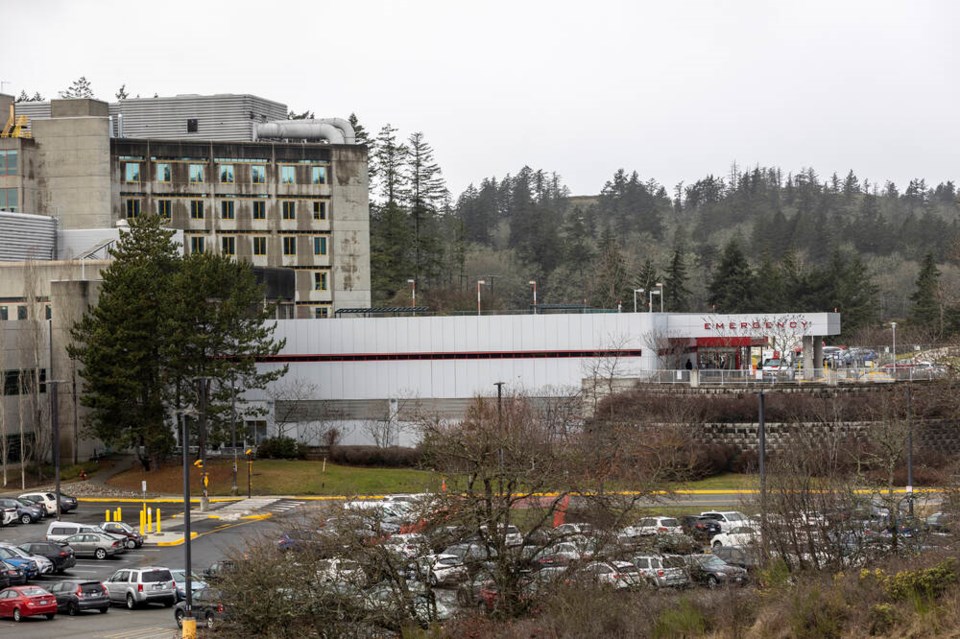An Island Health worker who lost his job after refusing to be vaccinated for COVID-19 says he might return to work in a casual position if his employer would hire him back, now that vaccine mandates have ended.
Then again, Jedediah Ferguson, who worked in the laundry department of Cumberland Regional Hospital, says he’s making more money in construction. “[The mandates] should have been rescinded a long time ago. B.C. is pretty much the only place on the planet that has those mandates in place.”
Ferguson, who was among almost 2,700 health-care workers fired over the mandate, is one of the petitioners in a class-action lawsuit that seeks compensation on behalf of all unionized health-care workers subject to the vaccine mandate.
The COVID-19 public health emergency declared March 17, 2020 — which included mask mandates, vaccination requirements, and restrictions on gathering and long-term care visits — ended on July 25. The vaccine mandate that was introduced October 2021 and renewed each of the two following years ended also.
Fired workers can reapply for their jobs but anyone working in public health-care facilities, including volunteers and contract workers, will be required to report their immunization status for COVID-19 and other communicable vaccine-preventable diseases, including mumps and measles.
The measure is intended to guide staffing decisions — from masking to re-assigned duties to temporary exclusion from work — in the event of future outbreaks or pandemics.
The B.C. Nurses Union says it will monitor any impact of the registry to ensure workers’ rights are protected.
Ferguson said he didn’t get vaccinated for COVID-19 because he didn’t believe the vaccine was effective. Because he worked in the laundry, a non-clinical facility, he felt he didn’t pose a risk to vulnerable patients.
Another petitioner in the class-action lawsuit, Terri Perepolkin, who was a lab tech at Vernon Jubilee Hospital in Vernon, said Henry is two years late in dropping the vaccine mandate, but it’s a step in the right direction.
“But I mean, it’s not stopping us or our lawsuit, because we weren’t suing to get the mandates dropped. We’re not suing to get our jobs back,” she said. “We’re suing to get compensation for the mistreatment that that was put on us, right?”
Perepolkin, who currently has no plans to re-apply for her job, said she and her children are immunized against other diseases, but she isn’t sold on flu vaccines and didn’t believe the COVID vaccine had been sufficiently tested at the time it was offered.“I want vaccines to work. I want them to be great.”
Perepolkin argues there’s no difference now between vaccinated and unvaccinated health-care workers because almost everyone’s had the disease or the vaccine, and immunity from 2021 shots has waned. “So no, there’s absolutely zero risk when you compare an unvaccinated person to someone who had [the vaccine] years ago.”
Victoria lawyer Umar Sheikh of Sheikh Law, which is leading the class-action suit, said in an email the government knew early on that the COVID vaccine was “ineffectual” at stopping the spread of the disease, yet continued to fire health-care workers for not getting it.
Sheikh maintains the government mandates have critically reduced health-care staffing that was already stretched. Those affected by the mandate should be offered their jobs back with back pay and full restitution, he said.
The Health Ministry said the 2,692 employees terminated as of July due to non-compliance with the provincial health officer’s vaccine order represent less than 1.2 per cent of those employed in B.C.’s public-health sector.
Of the fired workers, 484 — including 69 casual staff — are in the Island Health region. In emergency departments, one full-time, one part-time and five casual nurses were fired.
Health Minister Adrian Dix said after the vaccine mandate came into effect, B.C. led the country in the recruitment of nurses, doctors, health-sciences professionals and other health-care workers.
In 2022, B.C. had 38,935 nurses, up from 35,88 from 2020-2022, according to data from the Canadian Institute for Health Information. In Alberta, where there was no mandate, the number of health-care workers decreased, Dix said.
Dr. David Forrest Forrest, an infectious-disease specialist at Nanaimo Regional General Hospital, said he doesn’t expect the end of the vaccine mandate to have a meaningful impact on health-care worker staffing or availability.
As a health-care professional interacting, sometimes closely, with vulnerable patients, Forrest said he believes it’s his “ethical obligation” to undertake measures — from hand-washing to vaccination and masking — to reduce the risk of transmitting infectious pathogens to patients.
Forrest acknowledges that vaccination “only transiently” reduces the risk of acquiring and transmitting many, especially viral, diseases. But he said for those not following infection-control measures such as vaccination or mandatory masking, assignment to alternate duties is “not unreasonable.”
Aside from the effects on patient care, mandated vaccination can help help reduce health-care workers’ sick days by reducing the severity of infection, he said.
Dr. Réka Gustafson, Island Health chief medical health officer, called the risk that a health-care worker who is not vaccinated for COVID-19 poses for patients and colleagues “very negligible,” given that the vast majority of people who are vulnerable have been vaccinated.
She said that since COVID-19 has turned out to be “not strongly seasonal” and can repeatedly infect someone, the primary benefit of vaccination is now to the person being vaccinated.
In other communicable diseases, if the vaccine prevents you from getting infected for life, you can’t spread it to others.
Gustafson said it’s important to turn to other pressing health issues, such as the toxic-drug crisis, which killed 1,158 people in the first six months of this year, the BC Coroners Service recently reported.
Declared a public health emergency in 2016, the toxic-drug crisis has resulted in close to 15,000 deaths so far.




